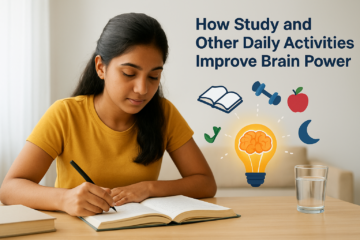Exams can be stressful, especially when you don’t have much time to prepare. However, with the right strategies, you can make the most of your available time and achieve great results. Here are some effective tips to help you prepare for exams even when you’re short on time.
1. Stay Calm and Focused
Panicking will only waste your valuable time. Take a deep breath, calm yourself down, and focus on what you can achieve. A positive mindset can make your study sessions more productive. Try relaxation techniques like deep breathing or meditation before starting your studies. This will help you stay calm and focused, allowing you to absorb information better.
2. Create a Quick Study Plan
- List all the topics you need to cover.
- Prioritize subjects and chapters based on their importance and your understanding.
- Allocate time slots for each topic to ensure you cover everything.
Instead of randomly choosing what to study, planning your time effectively will ensure you focus on crucial areas. Try dedicating more time to subjects or topics you find difficult and allocate revision slots to revisit those areas later.
3. Identify Important Topics
When time is limited, focus on key areas that carry more weight in the exam. Check past papers, syllabus outlines, and class notes to identify important topics. Skimming through your class notes can highlight recurring themes and concepts your teacher emphasized.
Teachers often repeat questions from previous exams, so practicing past papers will increase your chances of encountering familiar questions.
4. Use Effective Study Techniques
- Pomodoro Technique: Study for 25 minutes, then take a 5-minute break. This method maximizes concentration and helps you maintain focus.
- Active Recall: Write down what you remember after reading a topic. This technique strengthens memory by forcing your brain to retrieve information.
- Spaced Repetition: Review key concepts regularly to improve retention. This method involves reviewing content at increasing intervals to help you remember information longer.
5. Focus on Understanding Concepts
Instead of memorizing everything, focus on understanding the core concepts. This will help you apply your knowledge better in the exam. When you understand the “why” behind a concept, it becomes easier to recall and explain it during your exam.
Try simplifying complex topics into easier terms, using examples or storytelling methods to retain concepts effectively.
6. Use Visual Aids
Diagrams, mind maps, and flowcharts can simplify complex topics and improve memory retention. Visual tools can organize information better, making it easier to recall details. For example, use a flowchart to break down historical events or a mind map for key science concepts.
7. Practice with Past Papers
Solving previous years’ papers helps you understand the exam pattern and identify frequently asked questions. This can also boost your confidence. Try timing yourself while practicing to improve your speed and time management during the actual exam.
Additionally, review the model answers from past papers to understand how to structure your answers effectively.
8. Study in Intervals
Avoid long study sessions. Break your study time into smaller blocks with short breaks. This will help you stay focused and avoid burnout. Short bursts of study with breaks in between allow your brain to absorb information more effectively.
For instance, study for 40 minutes, then take a 10-minute break. Use this break to relax, hydrate, or take a short walk to refresh your mind.
9. Use Online Resources Wisely
Platforms like YouTube, educational websites, and apps can provide quick explanations for tough concepts. Focus on reliable sources to save time. Websites like BYJU’S, Vedantu, and Unacademy provide clear and concise video explanations, making it easier to grasp challenging topics quickly.
10. Avoid Distractions
Find a quiet place to study. Turn off social media notifications and minimize interruptions to stay focused. Consider using website blockers or phone apps that limit distractions during study time.
11. Revise Key Points Before Sleeping
Your brain processes information while you sleep. Reviewing important points before bed can improve retention. Reading aloud or summarizing content in your own words before sleeping can enhance memory consolidation.
12. Maintain a Healthy Routine
- Get enough sleep to stay alert and focused.
- Eat brain-boosting foods like nuts, fruits, and leafy greens.
- Stay hydrated to improve concentration.
Avoid sacrificing your sleep for long study hours. A well-rested mind is far more effective at retaining information than an exhausted one.
13. Use Mnemonics and Acronyms
Mnemonics are memory aids that use patterns of letters, ideas, or associations to help remember information. For example, the mnemonic “VIBGYOR” helps recall the colors of the rainbow. Using catchy acronyms can simplify memorizing long lists or formulas.
14. Focus on Writing Speed and Presentation
Practicing how to present your answers clearly and effectively can maximize your score. Write neatly, underline key points, and ensure your answers are well-structured. Practice writing within the allotted time to improve speed.
15. Stay Positive and Confident
Believe in yourself and your preparation. A positive attitude can improve your focus and reduce exam anxiety. Remind yourself that doing your best is what matters most.
Sample One-Day Study Plan for Quick Preparation
8:00 AM – 9:30 AM: Study a major topic with deep focus
9:30 AM – 9:45 AM: Take a short break
9:45 AM – 11:00 AM: Revise important formulas or key concepts
11:00 AM – 12:00 PM: Practice questions or sample papers
12:00 PM – 1:00 PM: Lunch and relaxation
1:00 PM – 2:30 PM: Study another important topic
2:30 PM – 3:30 PM: Practice writing answers
3:30 PM – 4:00 PM: Short break or walk
4:00 PM – 6:00 PM: Revise previously studied material
7:00 PM – 9:00 PM: Quick revision before bed
Final Tip:
Remember, it’s not about how much you study, but how well you study. Focus on understanding key points, practice smart strategies, and maintain a calm mindset. With these tips, you can perform your best even with limited preparation time.
“Success in exams comes from smart strategies, not just endless hours of study.”




